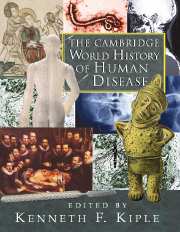Book contents
- Frontmatter
- Introduction
- Part I Medicine and Disease: An Overview
- I.1 History of Western Medicine from Hippocrates to Germ Theory
- I.2 History of Chinese Medicine
- I.3 Islamic and Indian Medicine
- I.4 Disease, Human Migration, and History
- Part II Changing Concepts of Health and Disease
- Part III Medical Specialties and Disease Prevention
- Part IV Measuring Health
- Part V The History of Human Disease in the World Outside Asia
- Part VI The History of Human Disease in Asia
- Part VII The Geography of Human Disease
- Part VIII Major Human Diseases Past and Present
- Indexes
- References
I.1 - History of Western Medicine from Hippocrates to Germ Theory
from Part I - Medicine and Disease: An Overview
Published online by Cambridge University Press: 28 March 2008
- Frontmatter
- Introduction
- Part I Medicine and Disease: An Overview
- I.1 History of Western Medicine from Hippocrates to Germ Theory
- I.2 History of Chinese Medicine
- I.3 Islamic and Indian Medicine
- I.4 Disease, Human Migration, and History
- Part II Changing Concepts of Health and Disease
- Part III Medical Specialties and Disease Prevention
- Part IV Measuring Health
- Part V The History of Human Disease in the World Outside Asia
- Part VI The History of Human Disease in Asia
- Part VII The Geography of Human Disease
- Part VIII Major Human Diseases Past and Present
- Indexes
- References
Summary
Greece and Rome
Before the fifth century B.C., ancient Greece had physician-seers (iatromantis) who combined magical procedures and drug treatments, and wound healers deft at caring for battlefield trauma. Another group of practitioners were engaged in medical dietetics, a tradition that developed primarily in response to the needs of athletes. Ultimately, it encompassed not only questions regarding exercise, bathing, and relaxation, but the regulation of food and drink for all citizens. All of these traditions eventually merged around 500 B.C. into a techne iatriche, or healing science, that sought to define its own intellectual approach and methodology. For this purpose, the new medicine adopted a theoretical framework capable of explaining the phenomena of health and illness. The new techne was also heavily dependent on clinical observations from which careful inferences and generalizations were derived.
The foremost representative of classical Greek medicine was Hippocrates, a prominent practitioner and teacher who came to personify the ideal Western physician. Within a century of his death in 370 B.C., several unknown disciples wrote nearly 60 treatises, come clinical and some theoretical, on medical subjects differing widely in content and style. This collection of writings, which comprised a comprehensive and rational healing system usually known as “Hippocratic” medicine, emphasized the individual patient. Its practitioners focused exclusively on physical factors related to health and disease, including the immediate environment. Indeed, among the most famous works of the Hippocratic corpus was the treatise Airs, Waters, and Places, an early primer on environmental medicine. Another was Epidemics, a day-to-day account of certain patients, and a third was Regimen, a prescription of diet and life-style conducive to health.
- Type
- Chapter
- Information
- The Cambridge World History of Human Disease , pp. 9 - 19Publisher: Cambridge University PressPrint publication year: 1993
References
- 1
- Cited by

